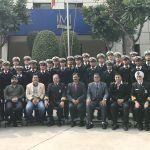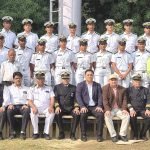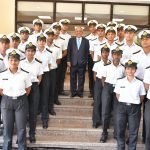
The modern maritime industry is undergoing a period of transformation. The new technological trends, such as automation and the creation of autonomous vessels, are changing the way people navigate the seas. As such, the maritime education of the future must also undergo changes. The International Maritime Institute, which is a leader in the field, is developing innovative ideas for nautical science education for the next generations of maritime workers.
One of the most notable aspects of the future education in the field is new learning technology. We ensure that the students are very familiar with the technology they will use across vessels. This includes advanced navigational systems, bridge simulators, which utilize elements of automation, and the most advanced data analysis tools which are required for route optimization and vessel performance reporting.
Apart from a technical field, the future workers must also be prepared to be individuals who study continuously. Because of the rapid development in the technology field, new technologies will emerge constantly, and the workers must be prepared to utilize them. We focus the efforts on teaching the critical thinking, problem-solving, and decision making, which will allow the students to be prepared for any dynamic environment.
Another factor that has been increasingly prevalent recently is the growing focus on environmentally safe practices. Considering that the maritime industry is an integral part of global trade, it should also be responsible for having a minimal carbon footprint. We specifically offering environmentally friendly papers on maritime practice, such as energy-saving, waste recycling, and environmentally safe reporting. In order to promote environmental protection and sustainability in shipping, IMI trains students in emerging technologies such as alternative fuels and green ship design. Moreover, they will be exposed to international rules and regulations that dictate environmental protection within the sea. These factors work to form a culture that will make IMI graduates the champions of the sustainability of the ship industry as they join the workforce. Fostering leadership and soft skills development. The future of nautical science needs more than technical knowledge. The students need to have soft skills such as effective leadership, communication, and teamwork. This is because life in the sea comes with complex challenges that can only be managed collectively.
IMI does not stop at training and equipping its students with leadership skills. IMI’s program also includes concepts such as effective communication skills and teamwork. This is through workshops, simulated scenarios, and group projects. Soft kill is imperative when the students are in a position of leadership in ships or when they venture into ship management.
The ship career has been male-dominated for ages. However, IMI recognizes the importance of inclusivity. The institution has put measures in place to bridge this gap to have more women in the field. The institution has put up a program that targets young women, encouraging them to participate in ships as a career. In addition, IMI promotes a safe environment that encourages girls to achieve the heights of the male-dominated sector.
The Maritime industry is an inherently international field. Safe navigation and successful vessel operation necessitate collaboration and communication with crew members that come from different regions. IMI understands the importance of global citizenship in the graduates. Therefore, the institute actively recruits students from all corners of the globe, ensuring a multicultural learning environment defined by cooperation between the students from different cultures. Through international exchange programs and joint research projects, IMI students can gather relevant experience and skills required for successful work in the globalized Maritime industry.
Are you prepared to navigate your path to a successful career on the high seas? Take a look at IMI’s creative programmes in nautical science and get started. Get more details on how IMI is revolutionising the maritime sector.
 The Caravel Group Appoints Angad Banga as Group Chief Executive Officer
The Caravel Group Appoints Angad Banga as Group Chief Executive Officer  IMI Celebrates 40 Graduating Cadets of Diploma in Nautical Sciences Batch 42 at Grand Passing-Out Ceremony
IMI Celebrates 40 Graduating Cadets of Diploma in Nautical Sciences Batch 42 at Grand Passing-Out Ceremony  Fleet Management Team Visits IMI Campus
Fleet Management Team Visits IMI Campus  Passing-Out Ceremony of ETO‑17 and GME‑42 Batches
Passing-Out Ceremony of ETO‑17 and GME‑42 Batches  Dr Harry Banga Inspires IMI Cadets
Dr Harry Banga Inspires IMI Cadets